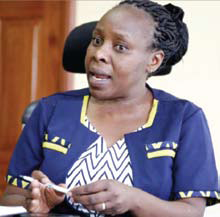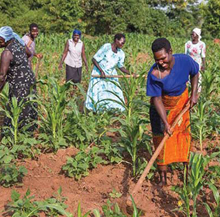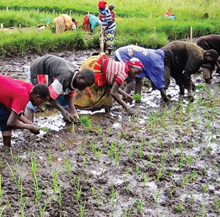Farmers Must Embrace SmartTechnology
To Survive Harsh Times,
Farmers Must Embrace SmartTechnology
Smart Harvest had a one-on-one interview with Nakuru CEC Agriculture Dr Immaculate Njuthe Maina on pertinent issues in agriculture
 What are the current issues farmers are grappling with in the county?
What are the current issues farmers are grappling with in the county?
Under crops, the main issue is lack of adequate certified seeds especially maize and potato. Kenya Plant Health Inspectorate Service (Kephis) has in the past intercepted fake seeds, an issue that affects quality and quantity production.
Agronomic systems are also not up to standards. For example, we are not having adequate extension officers to train farmers on best practice.
A number of farmers are also practising rainfed agriculture which is unsustainable in this era of climate change where rainfall patterns are unpredictable.
Post-harvest losses is also a concern because of lack of enough storage facilities. Cereal farmers have been struggling to store their produce .
And how are you addressing these issues?
On seeds, we are working closely with Kephis to sensitise farmers on identifying fake ones. We have adopted Nakuru Farmers Call Centre to link farmers with extension officers. This innovation aims to enhance delivery of agriculture extension services to farmers in Nakuru County through SMS, WhatsApp, Twitter, Facebook and calls. Through it, they are able to send inquiry to the call centre that is manned by a coordinator who refer them to respective agricultural experts for solutions.
They are sensitised on type of crops to grow, disease and pest management among others.
 As a way to survive these harsh times, we are encouraging farmers to adopt new crop production technologies. So far, we have 1,500 farmers who have moved from conventional farming to smart agriculture.
As a way to survive these harsh times, we are encouraging farmers to adopt new crop production technologies. So far, we have 1,500 farmers who have moved from conventional farming to smart agriculture.
This involves practices like minimum tillage and micro-irrigation. Micro-irrigation, also called localised irrigation, low volume irrigation, low-flow irrigation, or trickle irrigation is an irrigation method with lower pressure and flow than a traditional sprinkler system.
Minimum tillage, is a soil conservation system with the goal of minimum soil manipulation necessary for a successful crop production. It is a tillage method that does not turn the soil over. These are small efforts that make a big difference in terms of yields.
Many youth shy away from farming because it is considered dirty and unrewarding, what incentives have you put in place to encourage more of them to join farming?
Youth are among individuals we target to attain food security agenda. Recently, the county launched Youth in Agriculture initiative with Agritech-talks.
In the forum, youth are invited to discuss and see how to explore opportunities in agribusiness.
Maize farming is facing serious challenges and farmers are ditching maize for other ventures. What are you doing as a county to ensure large scale farmers do not lose hope in this venture? Yes there are serious concerns. Maize is grown on large farms in Rongai, Kuresoi North, Kuresoi South and Njoro all which experience ample rainfalls and have fertile spoils.
However, soil sampling is main challenge because majority of farmers do not understand type of fertilisers and seeds ideal for their localities.
To address this, Sh6 million has been set aside for soil sampling.
Extension services officers have also been trained on how to detect diseases in maize crop for example Maize Lethal disease and fall armyworm.
 In addition, there is at least one plant doctor in all wards to who conduct disease and pest surveillance for quick intervention.
In addition, there is at least one plant doctor in all wards to who conduct disease and pest surveillance for quick intervention.
Value addition is the future of farming, how are you helping farmers to tap into this huge potential?
Value addition is one of our focus areas in a bid to create employment for young people.
Our goal is also to stop exploitation of farmers by middlemen. We are also in talks with Kenya Defense Forces, to convince them to buy value added products from youths in our programmes.
Yes, there is a lot of opportunities in value addition and we need to work more closely with partners in the agriculture sector for example in avocado.
We are also encouraging farmers to form groups and cooperatives so that they can enjoy benefits of value addition and get access to best markets for their produce.
Research shows that women labour a lot on the farms but their toil is negligible, what incentives have you put to encourage them?
Yes you are right. Women are the ones who do ploughing, weeding, planting and harvesting of crops.
We as a county recognise their critical role and focus on programmes that seek to empower them. We are teaching them how to add value to their crops. The county has signed a contract with merging Mandos to champion for women projects in agriculture. Under the programme, women are trained on different farming technologies to boost their incomes.
Capital is a big issue for young people who want to venture into farming, what are some of the agri loan opportunities for women and youth?
Lack of capital is a big issue. The county does not give loans to farmers directly, but we encourage them to form groups and we help them lobby for finances in organisations like Agricultural Finance Cooperation. We are also linking them with different financial institutions that offer agri loans like banks.
So far, we have several groups funded to rear pigs. There are 100 youth groups that were provided with chicks by Bidco Land O’Lakes in poultry value chain.